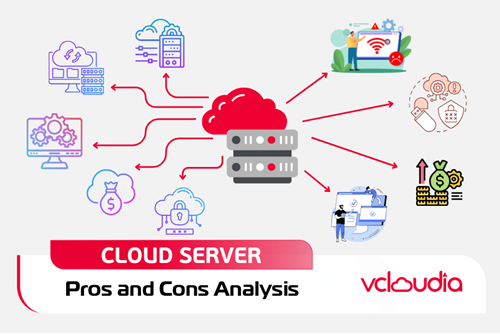Advantages and Disadvantages of Cloud Servers
Jun 18, 2025Cloud Servers have become a go-to data storage solution for many businesses due to their outstanding benefits in scalability, performance, and cost-efficiency. However, is this solution perfect for every organization? In this article, (Vcloudia) will break down the key advantages and disadvantages of Cloud Servers, helping you make the most informed decision for your business.
Advantages of Cloud Servers
1. Flexibility
One of the greatest strengths of Cloud Servers is the ability to quickly scale resources up or down based on real-time usage. Businesses no longer need to invest heavily in complex hardware systems, reducing wasted resources during idle periods. Application deployment and software upgrades are also fast and seamless—no need for long waiting times.
2. High Stability and Availability
Cloud Servers are designed to deliver near-perfect uptime and system continuity. Most Cloud Server providers offer Service Level Agreements (SLAs) with guaranteed high uptime rates.
If a failure occurs on one server, services and data are immediately transferred to another, minimizing downtime. This ensures that critical systems like websites and applications can operate reliably 24/7.
3. Easy Management
With a user-friendly interface, smart management tools, and remote monitoring, Cloud Servers allow businesses to manage resources easily from anywhere. Tasks like maintenance, software updates, data backup, and security configurations can be done in just a few clicks through an online dashboard—saving time, manpower, and reducing operational risk.
4. Cost-Efficiency
Unlike traditional server models, Cloud Servers follow a pay-as-you-go pricing model. Businesses only pay for the resources they actually use, significantly reducing initial capital investment in hardware.
For example, a startup can begin with a basic Cloud Server package and scale up as the company grows—without having to upgrade physical infrastructure. Moreover, maintenance, power, and cooling costs are offloaded to the cloud service provider.
5. High Security
Cloud Servers offer comprehensive security features to protect your data. These include data encryption, multi-factor authentication, and advanced firewalls to block cyber threats.
In addition, data on Cloud Servers is often automatically backed up across multiple data centers, ensuring quick recovery in the event of disasters or attacks.
Disadvantages of Cloud Servers
Despite the many benefits, Cloud Servers also have some drawbacks that businesses should consider before implementation:
-
Internet Dependency: Cloud Servers rely entirely on a stable internet connection. Any disruptions or slowdowns in your connection can severely impact system performance and operational continuity.
-
Limited Control Over Data: Although security measures are strong, storing data on third-party infrastructure may still pose privacy and control concerns, especially for sensitive or regulated information.
-
Cost Accumulation Over Time: While the initial cost is low, businesses with heavy and long-term resource demands may see costs grow rapidly. Effective resource management is essential to avoid unexpected expenses.
-
Compatibility Issues: Migrating legacy systems to the cloud can be challenging, especially if existing software is not cloud-compatible. The process might require customizations or upgrades—resulting in higher time and cost commitments.
Vcloudia Cloud Server – The Cloud You Can Count On
If you're concerned about the potential limitations of Cloud Servers, Cloud server by Vcloudia is a reliable solution for businesses of all sizes. With a modern infrastructure and comprehensive customer support, Vcloudia delivers a cloud experience with:
-
Powerful connectivity to ensure stable 24/7 access
-
Advanced security standards, compliant with international certifications such as ISO 27001:2013, ISO 20000:2018, ISO 9001:2015
-
Flexible pricing packages tailored to your specific business needs
-
Expert technical support, making migration and system deployment fast, safe, and compatible
Conclusion
Cloud Servers offer significant advantages—from flexibility and cost-efficiency to ease of management and strong security. However, to ensure successful adoption, businesses must understand both the strengths and limitations of Cloud Servers and choose a reliable service provider.
With Vcloudia, you can rest assured that Cloud Server limitations will be minimized—allowing your business to focus on sustainable growth and innovation.
Related news
Data Center vs. Cloud Computing: Which Model Should You Choose?
Both Data Centers and Cloud Computing serve the purpose of storing and managing data. Businesses can use either a Data Center or Cloud Computing to operate their systems.
What is a Cloud Server? How Cloud Servers Work
Unlimited transmission speed, maximum end-user bandwidth | High-speed storage. Free trial – Unlimited storage, industry-leading speed – Get 20% off! Services: SSD Virtual Server, 99.9% Uptime, ISO 27017:2015 Certified.
Who Should Use Cloud Servers?
Cloud Server is designed for a wide range of users, including small and medium-sized businesses, startups, developers and software engineers, as well as individual users looking for reliable and scalable computing resources. Stay informed by signing up to receive the latest updates and offers.
8 Real-World Applications of Cloud Servers Today
Some examples of reputable Cloud Server based software development and testing platforms are AWS CodeStar, Azure DevOps, Google App Engine and Viettel Open ...
What is Data Backup? Why Is It Important?
To ensure data security and prevent potential mishaps, data backup plays a critical role. So, what exactly is backup, and what should users consider before performing a backup? Let's explore these with Vcloudia.
Comparison Between Public Cloud and Virtual Private Cloud (VPC)
Public Cloud and Virtual Private Cloud (VPC) are two common forms of cloud computing environments. So, should a business use Public Cloud or Virtual Private Cloud? Let Vcloudia help you decide through the following analysis.
Cloud Computing Applications in Banking
Cloud computing is becoming a core technology in the banking sector, offering breakthroughs in performance and helping financial institutions keep pace with the global digital transformation trend.

